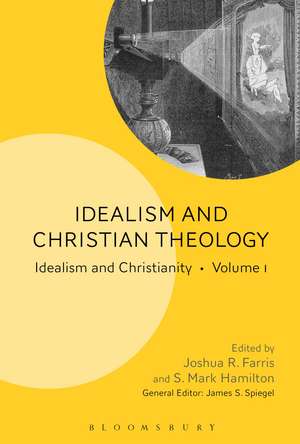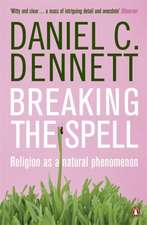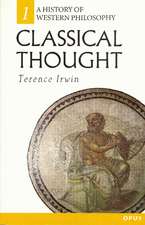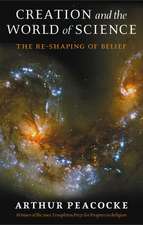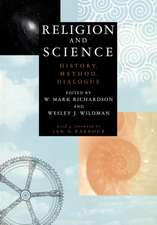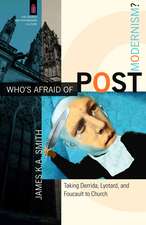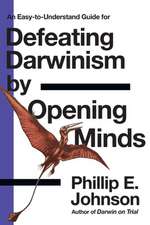Idealism and Christian Theology: Idealism and Christianity Volume 1
Editat de Dr. Joshua R. Farris, Dr. S. Mark Hamilton, Professor James S. Spiegelen Limba Engleză Paperback – 23 aug 2017
| Toate formatele și edițiile | Preț | Express |
|---|---|---|
| Paperback (1) | 257.12 lei 6-8 săpt. | |
| Bloomsbury Publishing – 23 aug 2017 | 257.12 lei 6-8 săpt. | |
| Hardback (1) | 656.73 lei 6-8 săpt. | |
| Bloomsbury Publishing – 24 feb 2016 | 656.73 lei 6-8 săpt. |
Preț: 257.12 lei
Preț vechi: 330.99 lei
-22% Nou
Puncte Express: 386
Preț estimativ în valută:
49.21€ • 51.31$ • 40.89£
49.21€ • 51.31$ • 40.89£
Carte tipărită la comandă
Livrare economică 20 martie-03 aprilie
Preluare comenzi: 021 569.72.76
Specificații
ISBN-13: 9781501335853
ISBN-10: 1501335855
Pagini: 256
Dimensiuni: 229 x 152 x 20 mm
Greutate: 0.35 kg
Ediția:NIPPOD
Editura: Bloomsbury Publishing
Colecția Bloomsbury Academic
Locul publicării:New York, United States
ISBN-10: 1501335855
Pagini: 256
Dimensiuni: 229 x 152 x 20 mm
Greutate: 0.35 kg
Ediția:NIPPOD
Editura: Bloomsbury Publishing
Colecția Bloomsbury Academic
Locul publicării:New York, United States
Caracteristici
Applies Idealism to assorted issues in contemporary theology
Notă biografică
Joshua R. Farris is Assistant Professor of Theology at Houston Baptist University, Smith College of Liberal Arts and the Academy. He is the chief editor (with Charles Taliaferro) for Ashgate Research Companion to Theological Anthropology (2015). S. Mark Hamilton is a PhD candidate University of Bristol, UK. He is co-editor of New England Dogmatics: A Systematic Collection of Questions and Answers in Divinity (2014). James S. Spiegel is a Professor of Philosophy and Religion at Taylor University in Upland, Indiana, USA. His books include The Love of Wisdom (2010), Faith, Film, and Philosophy (2007), Hypocrisy: Moral Fraud and Other Vices (1999), and the award-winning How to be Good in a World Gone Bad (2004).
Cuprins
Acknowledgements Introduction: Idealism and Christian Theology Joshua R. Farris (University of Bristol, UK) and S. Mark Hamilton (Free University of Amsterdam, The Netherlands)1. The Theological Orthodoxy of Berkeley's Immaterialism James S. Spiegel (Taylor University, USA)2. Berkeley, Edwards, Idealism and the Knowledge of GodWilliam J. Wainwright (University of Wisconsin-Milwaukee, USA)3. Idealistic Panentheism: Reflections on Jonathan Edwards's Account of the God-World Relation Jordan Wessling(University of Notre Dame, USA)4. Berkeley, Realism, Idealism and Creation Keith Yandell (University of Wisconsin-Madison, USA)5. Edwardsian Idealism, Imago Dei, and Contemporary TheologyJoshua R. Farris (University of Bristol, UK)6. On the Corruption of the Body: A Theological Argument for Metaphysical Idealism S. Mark Hamilton (Free University of Amsterdam, The Netherlands)7. Idealism and the Resurrection Mark Cortez (Wheaton College, USA)8. Jonathan Edwards, Idealism, and Christology Oliver D. Crisp (Fuller Theological Seminary, USA)9. Jonathan Edwards's Dynamic Idealism and Cosmic ChristologySeng-Kong Tan (Biblical Graduate School of Theology, Singapore)10. Idealism and Participating in the Body of Christ James Arcadi (University of Bristol, UK)11. Idealistic Ethics and Berkeley's Good GodTimo Airaksinen (University of Bristol, UK)Notes on ContributorsIndex
Recenzii
[A] well-constructed collection of articles aimed at showing the relevance and plausibility of theistic idealism . A book for the discerning reader, I recommend it to the student and to the scholar.
The 'Idealism and Christianity' series is the first of its kind, an inauguration of a rich conversation in metaphysics that manages to be coherent, insightful, and accessible to students and professors alike.
This anthology is of excellent analytical quality and strives for historical sensitivity. The overarching agreement between this papers means that each essay hangs together well and the collection flows through various loci of Christian doctrine smoothly.
The philosophical idealists addressed in this volume teach that minds are most real, that the physical world depends for its being on the mind (especially the mind of God), and that matter is a fiction when depicted as a substance that undergirds reality. Few late-modern thinkers have found their arguments convincing. But in the pages of this volume a diverse array of first-rate metaphysical minds seek to rehabilitate some of the features of the idealism of Bishop George Berkeley and the Rev. Jonathan Edwards for contemporary theology. Their efforts will surely generate a good deal of debate, but they deserve careful attention from intellectual historians, philosophers, and constructive theologians.
In a materialist age, the idealist notion that esse est percipi aut percipere ("to be is to be perceived or to perceive") is not a popular one. Yet, a number of brilliant thinkers in the Christian tradition have argued that what we call matter is really a set of ideas in the mind of God. This solid collection of essays puts two of the most prominent idealists, George Berkeley and Jonathan Edwards, in dialogue with each other. This book well deserves to be the catalyst for continuing theological discussion of idealist metaphysics.
Idealistic metaphysics is the oxygen of speculative theology. Any faith seeking reason must wrestle with the philosophical significance of those idealistic arguments that have shaped Christian theology since its inception in the school of Alexandria. This volume focuses on two of the greatest modern proponents of an idealistic metaphysics within the Christian tradition: Edwards and Berkeley. The essays here offer a fascinating and rich foray into some of the key questions of philosophical theology. Idealism may not be fashionable but its persisting power is admirably demonstrated in this fine collection.
The 'Idealism and Christianity' series is the first of its kind, an inauguration of a rich conversation in metaphysics that manages to be coherent, insightful, and accessible to students and professors alike.
This anthology is of excellent analytical quality and strives for historical sensitivity. The overarching agreement between this papers means that each essay hangs together well and the collection flows through various loci of Christian doctrine smoothly.
The philosophical idealists addressed in this volume teach that minds are most real, that the physical world depends for its being on the mind (especially the mind of God), and that matter is a fiction when depicted as a substance that undergirds reality. Few late-modern thinkers have found their arguments convincing. But in the pages of this volume a diverse array of first-rate metaphysical minds seek to rehabilitate some of the features of the idealism of Bishop George Berkeley and the Rev. Jonathan Edwards for contemporary theology. Their efforts will surely generate a good deal of debate, but they deserve careful attention from intellectual historians, philosophers, and constructive theologians.
In a materialist age, the idealist notion that esse est percipi aut percipere ("to be is to be perceived or to perceive") is not a popular one. Yet, a number of brilliant thinkers in the Christian tradition have argued that what we call matter is really a set of ideas in the mind of God. This solid collection of essays puts two of the most prominent idealists, George Berkeley and Jonathan Edwards, in dialogue with each other. This book well deserves to be the catalyst for continuing theological discussion of idealist metaphysics.
Idealistic metaphysics is the oxygen of speculative theology. Any faith seeking reason must wrestle with the philosophical significance of those idealistic arguments that have shaped Christian theology since its inception in the school of Alexandria. This volume focuses on two of the greatest modern proponents of an idealistic metaphysics within the Christian tradition: Edwards and Berkeley. The essays here offer a fascinating and rich foray into some of the key questions of philosophical theology. Idealism may not be fashionable but its persisting power is admirably demonstrated in this fine collection.
